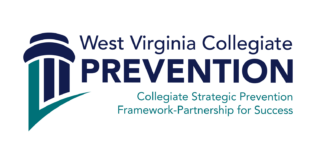The WV Collegiate Strategic Prevention Framework Partnerships for Success (C-SPF PFS) initiative’s overall goal is to prevent the onset and reduce the progression of substance misuse and its related problems among higher education students (ages 18 and older) in a 21-county area covering southern West Virginia. The federal grant was awarded by the Substance Abuse and Mental Health Services Administration (SAMHSA) to Marshall University’s Center of Excellence for Recovery. The five-year initiative began August 31, 2020. The overall goal will be achieved through the following.
1) Developing connections between higher education institutions and their local prevention community coalitions to ensure:
2) Increasing prevention infrastructure and capacity for culturally sensitive, data-driven, evidence-based practice among higher education institutions in Southern West Virginia:
3) Conducting needs assessment to inform the development of a strategic plan and evidenced-based interventions;
4) Increasing evidenced-based trainings and substance misuse prevention activities on campuses through SPF planning and implementation to ensure it is accessible by all students, faculty, and staff; and
5) Conducting outcome evaluation and dissemination of findings for the C-SPF PFS Initiative.
C-SPF-PFS Mission Statement
The C-SPF-PFS’s mission is to enhance and support the existing prevention infrastructure among higher education institutions in Southern WV to prevent the onset and reduce the progression of substance misuse among students.
Vision Statement
The vision of the C-SPF-PFS Initiative is that institutes of higher education in Southern WV will have a strong, sustainable prevention infrastructure and the capacity to prevent the onset and reduce the progression of alcohol, tobacco, vaping, cannabis, and prescription drug misuse and its related problems among their students. In order to achieve this:
- We will enhance existing prevention infrastructure and expand the workforce by increasing prevention advocacy efforts and integrating ethical prevention practices within a variety of professional disciplines.
- We will build capacity through new partnerships that are strong and effective.
- We will utilize evidence-based practices that are culturally competent, and data driven.
- We will host and promote evidence-based trainings and substance misuse prevention activities on campuses.
Prevention Principles
SPF Model (Assessment, Capacity, Planning, Implementation, Evaluation)
Ethical Prevention Practices
Collaboration
Cultural Competency (race, ethnicity, age, ability, language, gender, socio-economic status, sexual orientation, gender identity, gender expression, nationality, religion).
Sustainable
Evidence-Based Practices, Policies and Programs Utilizing a Public Health Approach
Data-Driven Decision Making
For more information contact:
Project Director: Lori Garrett-Bumba: garrettbumba@marshall.edu
